Conversational AI is rapidly turning into a cornerstone of business operations, especially in customer service and sales. This is particularly visible with the surge in Large Language Model development. In fact, by 2026, as many as 95% of all client interactions will be through channels supported by artificial intelligence algorithms.

What makes conversational agents so impactful is their advanced capabilities in understanding natural language, maintaining contextual awareness, and continuously learning. Compared to traditional rule-based chatbots, AI systems offer greater value to businesses, making conversations more engaging and effective.
Many global brands have seen firsthand how transformative this technology can be. Let’s dive into 17 powerful Conversational AI examples across various industries. See how AI bots and virtual assistants (VA) can take your business to the next level.
Table of Contents
Tangible Business Benefits of Conversational AI
Beyond the hype, interactive agents deliver a clear return on investment for enterprises. Let’s examine the quantifiable advantages:
- Enhanced customer experience. Global leaders utilizing AI report impressive results, including a 69% improvement in client care quality, 55% decreased wait times, and a 48% boost in satisfaction.
- Increased agent productivity. Artificial intelligence automates repetitive tasks, resolves simpler issues, and unburdens employees, resulting in a remarkable 94% increase in efficiency.
- Reduced operational costs. Conversational AI also offers significant cost savings. Chatbots slash per-query costs to $1 (from $5-12 with live agents) and streamline internal workflows. Every second shaved off call handling times saves over $1M annually.
- Improved data collection and analysis. 61% of failed calls stem from poor data access. VAs provide valuable insights by analyzing interactions, optimizing user experiences, and informing targeted marketing. A conversation analytics solution makes these insights actionable by surfacing intent gaps, escalation drivers, and friction points you can fix to improve containment and conversion.
- Boosted bottom line. The technology can unlock up to a 30% reduction in client support service fees while automating 80% of routine tasks. This positions companies for future growth and gaining a competitive edge.
The numbers speak for themselves: artificial intelligence is undeniably a strategic investment. Next, we’ll analyze actual Conversational AI use cases and real-world success stories.
AI Use Cases Across Key Industries
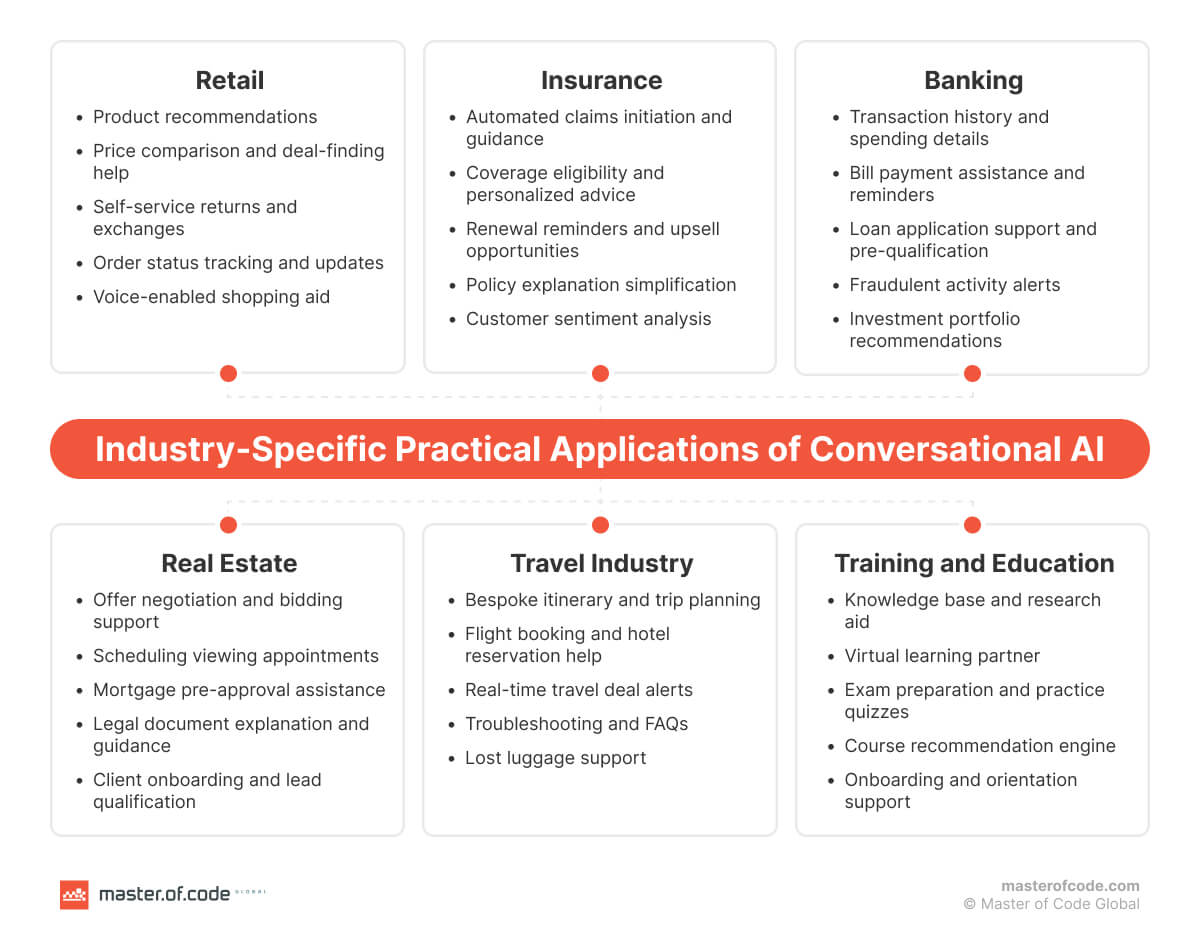
Retail
Interactive solutions enhance the shopping experience by providing instant, personalized support. Retailers use AI to streamline customer service, collect valuable feedback, and cut costs. Industry adoption reflects this trend: 42% of merchandisers integrated the technology, with another 34% exploring its potential.
Here’s how Conversational AI disrupts this domain:
- AI-powered product recommendations;
- Virtual try-on for fashion and beauty items;
- Price comparison and deal-finding assistance;
- Tailored shopping advisor (style, preferences);
- Inventory lookup and stock availability checks;
- Self-service returns and exchanges;
- Automated order status tracking and updates;
- Chatbot for handling post-purchase matters;
- Loyalty program management and rewards;
- Voice-enabled shopping aid.
Let’s delve into specific examples showcasing how AI breathes life into some of these use cases.
Shopify-Integrated Chatbot for the Electronics Retailer
To increase direct-to-consumer sales and improve user experience, a leading US manufacturer partnered with Master of Code Global and Infobip to create an AI-powered bot integrated with Shopify. This tool acts as a virtual shopping assistant. It uses Generative AI to understand buyer needs and provide customized recommendations. The solution, deployed in time for Black Friday, streamlined interactions and the purchase process.
This resulted in impressive outcomes:
- 80% CSAT score;
- 84% engaged session rate;
- ~$300 average order value.
Luxury Jewelry Brand’s Intelligent Bot
A global iconic jewelry retailer sought to optimize international consumer support and eliminate long wait times for clients in different time zones. Master of Code Global developed a sophisticated routing chatbot to address this challenge. The solution seamlessly directs inquiries to available agents based on location.
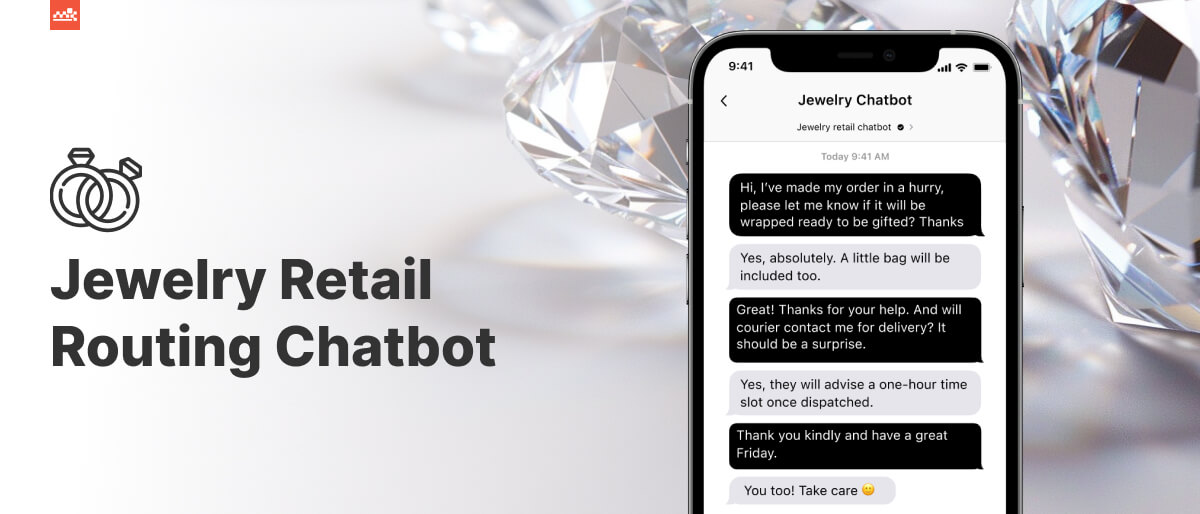
We built a convenient communication channel for iOS users while overcoming the technical issues of a pre-existing bot. Some achievements of the tool within the first month after launch include:
- 200+ Canadian clients engaged;
- 4,603 conversations with USA buyers;
- 150+ supportive chats with UK users.
Insurance
From getting timely quotes to filing claims, AI-powered chatbots offer always-on assistance and tailored guidance. With 74% of insurance companies ramping up AI investment, the industry is prioritizing the adoption of these transformative technologies.
Conversational AI is optimizing the sector’s operations through:
- Policy quote generation and comparison;
- Automated claims initiation and guidance;
- Coverage eligibility and personalized advice;
- Chatbot for policy and billing inquiries;
- AI-driven fraud detection and risk assessment;
- VA for scheduling appointments;
- Renewal reminders and upsell opportunities;
- Document processing and form filing consulting;
- Policy explanation simplification;
- Customer sentiment analysis for service improvement.
Let’s see how leading insurance firms are putting these capabilities into action.
GEICO
The company’s VA suggests policyholders a convenient and accessible way to manage their insurance needs. The chatbot provides immediate answers to common questions about coverages, billing information, and document retrieval. With its ability to learn and adapt to user demands, the assistant optimizes the journey, making it less intimidating and more efficient for GEICO clients.
AXA
Multinational insurer leverages machine learning and natural language processing (NLP) to provide customers with immediate round-the-clock guidance. This translates to handling an impressive 200 thousand conversations annually. Their chatbot tackles routine inquiries, significantly reducing wait times and freeing up agents to focus on complex cases. It also offers practical self-service options, facilitating 300 new insurance cards per day. With its ability to continuously learn and improve, AXA’s bot elevates buyer retention.
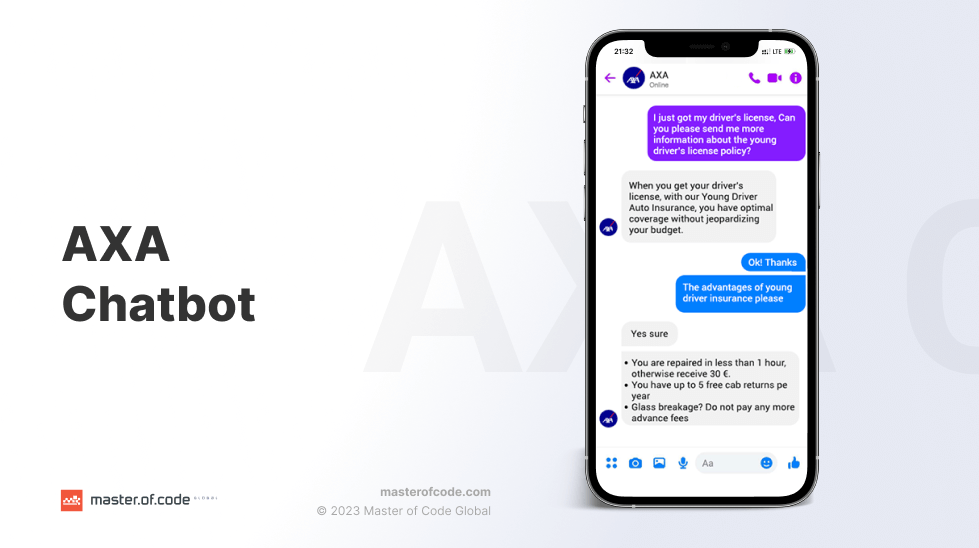
Banking
This industry is becoming more accessible and personalized than ever before, thanks to Conversational AI. Chatbots deliver instant financial advice and secure transaction support, empowering customers while improving operational efficiency. With banks prioritizing data insights (82.5%), bot optimization (72.5%), and self-service solutions (65.5%), the future promises even greater convenience.
Here’s how AI agents are redefining the finance domain:
- Transaction history and spending details;
- Real-time account balance updates;
- Card activation and replacement management;
- Bill payment assistance and reminders;
- AI-powered financial advisor;
- Safe money transfers (domestic and international);
- Chatbot for resolving disputed transactions;
- Loan application support and pre-qualification;
- Fraudulent activity alerts;
- Investment portfolio recommendations.
Global brands like Morgan Stanley and CIBC Bank are at the forefront of Conversational AI in banking. Let’s take a closer look at their solutions.
Morgan Stanley
Built on OpenAI’s advanced GPT-4 technology, the organization’s assistant provides advisors with lightning-fast access to Morgan Stanley’s massive research database. Unlike traditional search engines, it understands full-sentence queries, presenting tailored insights. This innovation streamlines analysis, empowering consultants to dedicate more time to building client relationships and delivering customized advice.
CIBC Bank
The VA of this financial services corporation revamps how clients manage their banking. It answers questions and completes transactions with ease. Customers can send e-transfers, pay bills, and even lock their credit cards through the interactive agent. Available 24/7, it offers convenient, on-demand aid. Should complex issues arise, the assistant seamlessly transmits users to a live specialist. CIBC’s solution puts essential financial functions directly at consumers’ fingertips.
Real Estate
The sector is also undergoing a client-centric transformation, fueled by AI innovation. Despite legacy systems remaining prevalent (61%), forward-thinking companies are actively adopting AI. Real estate chatbots share tailored property recommendations, automate routine tasks, and qualify leads around the clock – fostering solutions that outdated infrastructure cannot.
Conversational AI-powered digital journey can comprise:
- Virtual tours and walkthroughs;
- AI-matched property listings based on preferences;
- Offer negotiation and bidding support;
- Chatbot for scheduling viewing appointments;
- Mortgage pre-approval assistance;
- Neighborhood data and comparable property analytics;
- Legal document explanation and guidance;
- Home valuation and market trend reports;
- Client onboarding and lead qualification;
- Automated property maintenance updates.
Let’s see how this translates to practical applications, with examples from industry-leading firms.
Century 21
This brand boosts network-wide lead generation with the roll-out of RiTA, an AI-powered lead nurturing tool. Integrating seamlessly with the C21 eSales platform, RiTA automates personalized SMS conversations, identifies opportunities, qualifies prospects, and directly updates the CRM. CEO James Bell announced this initiative with widespread enthusiasm, highlighting the company’s commitment to boosting agent performance in a competitive market.
Zillow
Marketplace enters the Conversational AI arena with its new ChatGPT plugin. This tool allows users to search listings using natural language queries. Zillow CEO Rich Barton sees this as a potential turning point in real estate technology. The organization aims to improve both customer experience and agent productivity. While still in its early stages, the plugin signals their dedication to maximizing value for their customers.
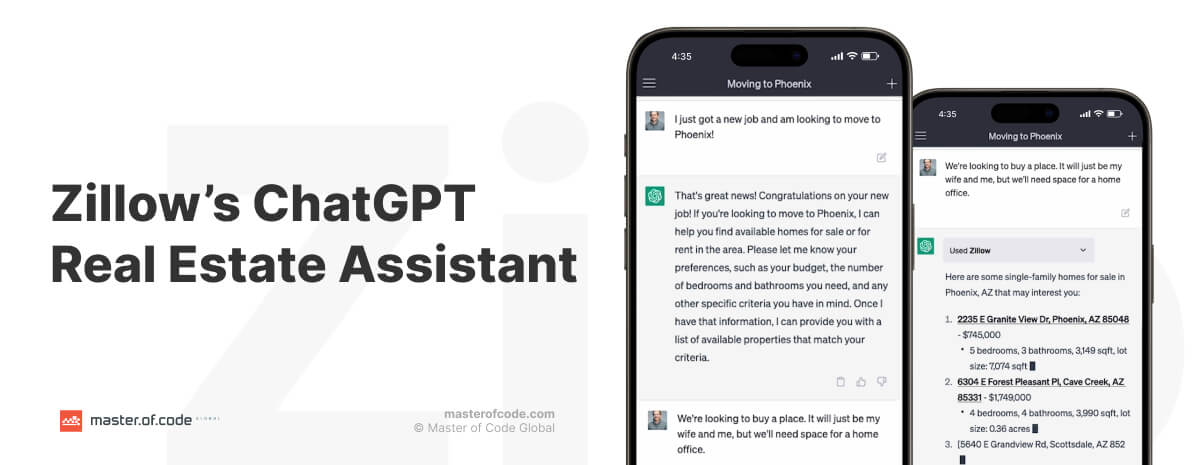
Travel Industry
The sector occupies a significant 16% share among the top chatbot-adopting fields. This widespread adoption is driven by clear user preferences: 33% of travelers want AI assistants for bookings, while ⅔ find them valuable for managing journey details.
Let’s delve into the specific ways Conversational AI transforms the travel experience:
- Bespoke itinerary and trip planning;
- Flight booking and hotel reservation help;
- Real-time travel deal alerts;
- Virtual destination guide and local recommendations;
- Bot for troubleshooting and FAQs;
- Automated currency exchange calculations;
- Lost luggage support;
- Transportation scheduling and advice;
- Visa and passport information assistance;
- Virtual travel agent for concierge-like services.
Luxury Escapes and Instalocate are putting AI into action; let’s now discuss their strategies.
Luxury Escapes
The company sought a new channel to personalize deals and streamline the booking experience. To help the brand, we built a Messenger chatbot that allowed users to search for their dream vacation as per their preferences. This conversational approach, paired with a paid social campaign, generated impressive engagement. The bot also featured a fun “Roll the Dice” game for random destination inspiration. Through strategic retargeting based on user behavior, the bot adjusted offers and boosted sales significantly.
Results include:
- 3x higher conversion rate compared to their website;
- $300K+ in revenue within the first 90 days;
- 89% reply ratio to retargeting messages;
- 16,800+ plays of the “Roll the Dice” game.
Instalocate
Instalocate is an AI-powered chatbot specializing in flight tracking and travel assistance. It leverages real-time data to keep users informed about their flights, delays, cancellations, and even potential hotel availability issues. Travelers can subscribe for proactive alerts, minimizing disruptions. Additionally, it tackles the complexities of obtaining compensation for flight-related problems directly with airlines.
Training and Education
Recent research highlights three key areas where students benefit from AI-powered chatbots: homework assistance, personalized learning experiences, and skill development. Educators reap significant rewards as well, ranging from time-savings to enhanced pedagogical approaches.
Here are some of the practical applications of Conversational AI in education:
- AI-based adaptive learning paths;
- Customized tutoring and study guides;
- Chatbot for learners’ inquiries and administrative tasks;
- Automated essay grading and feedback;
- Knowledge base and research aid;
- Virtual language learning partner;
- Exam preparation and practice quizzes;
- Learning and development analytics for instructors;
- Course recommendation engine;
- Student onboarding and orientation support.
Here is how reputable universities are embracing this technology.
University of Galway
Cara, NUI Galway’s AI-powered virtual assistant, offers students swift aid. It handles common inquiries about fees, registration, and campus resources. VA’s adaptive knowledge base ensures answers stay relevant to the learner’s journey. Where necessary, the interactive tool seamlessly connects users to human staff. This responsive approach helps prevent minor issues from escalating, reducing student stress levels.
Georgia State University
The organization observed significant strides in academic success after the launch of the “Pounce” chatbot. Learners receiving text reminders about assignments, resources, and course content earned higher grades. Remarkably, first-generation students saw an 11-point boost in final grades. The bot’s direct, personalized support was especially impactful for those with less academic experience, enhancing their overall performance.
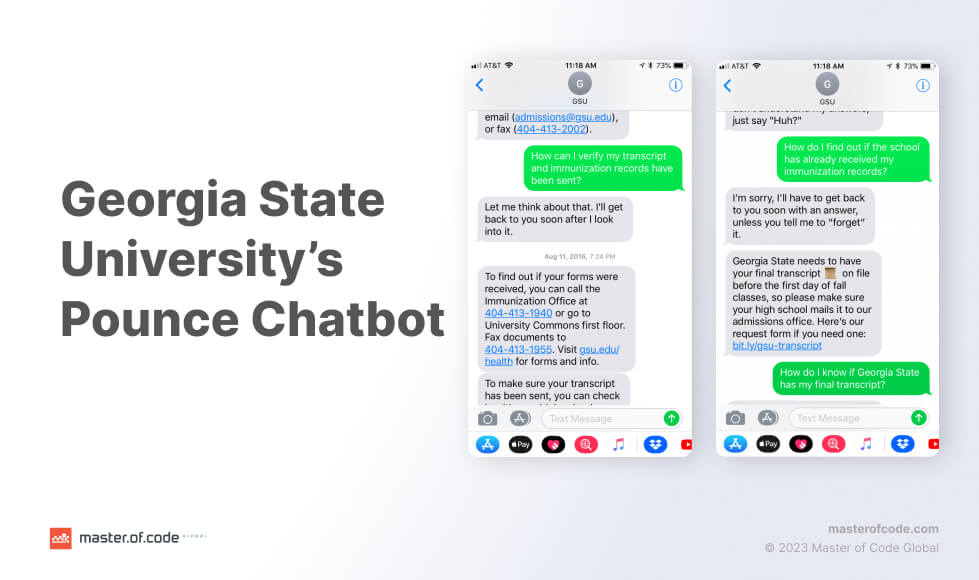
How Can Businesses Utilize AI-Powered Interactive Agents?
Seeing Conversational AI use cases in action highlights its potential to cut costs and boost profitability. Let’s identify specific areas where it can elevate your operations.
Consumer Engagement
Clients can get immediate assistance anytime with the help of AI. The technology facilitates human-like interactions that build trust and foster stronger relationships. With Conversational AI for customer engagement, companies can proactively answer questions, resolve issues quickly, and even collect valuable feedback. Thus, such tools enhance the buyer journey and strengthen brand loyalty.
Take Dr. Oetker’s Giuseppe Virtual Assistant for instance. It streamlined contest entry, offered instant prizes based on unique codes, and integrated an AR Instagram filter. This user-centric approach created a memorable, interactive experience for Gen Z audiences.
Conversational Commerce
Imagine shopping directly from one’s favorite messaging app. Conversational commerce makes this possible, empowering buyers to find what they need and complete purchases effortlessly. VAs deliver personalized recommendations, provide instant answers, and streamline checkout. This frictionless approach enhances user satisfaction and boosts sales.
A prime example is the Satellite Radio Provider’s Chatbot developed by Master of Code Global. It assists with payments and tech support, achieving an 80% containment rate for streaming-related issues. This self-service solution has also increased subscriptions by an impressive 46%.
Marketing and Lead Generation
With conversational solutions, enterprises can engage with prospects at scale, turning dialogues into conversions. VAs qualify leads around the clock and nurture them through the sales funnel. This targeted approach significantly boosts marketing ROI.
For example, Aveda’s Booking Chatbot streamlined the appointment process, making it easier for customers to book services. The integration of this conversational system led to a 7.67x increase in reservations. The brand also achieved a 33% conversion rate for their complimentary service promotion.
HR and Internal Support
Organizations reap significant gains in productivity by integrating AI chatbots into HR functions. The agents answer employee questions instantly, providing onboarding guidance, and streamlining processes like benefits inquiries or performance reviews. This efficiency boost frees up HR teams while enhancing the workers’ experience and well-being.
A prime example is a Fortune 500 Biotechnology Company’s Bot. It connects support agents with supervisors for quick resolution of complex queries. Such solutions reduce pressure on new employees and allow them to better serve their clients.
Healthcare organizations are increasingly turning to AI-powered triage assistants to optimize front-line operations and improve patient experience. These systems conduct symptom assessments, prioritize cases based on urgency, and guide patients to the right level of care—without overwhelming staff.
A strong example is the regional healthcare network that partnered with Master of Code Global to implement a Conversational AI solution as their first line of communication. Integrated with both scheduling and EHR systems, the bot now handles patient intake across channels, reducing average wait times by over 60% and freeing up providers to focus on complex cases. It’s a clear win for both operational efficiency and patient satisfaction.
Data Collection and Analysis
With interactive agents, businesses unlock a treasure trove of insights from interactions. Analyzing these conversations reveals helpful details on user preferences, pain points, and trends, empowering enterprises to refine their strategies.
For instance, a Telecom Provider’s Virtual Assistant collected valuable data across over 40 use cases. Through careful analysis, these records helped identify and optimize bottlenecks. The chatbot’s impressive containment rates ranging from 45% to 73% demonstrate how AI drives self-service and enriches the digital journey.
Conclusion
The future of business interactions lies in Conversational AI. The ability to personalize experiences, optimize processes, and reveal crucial insights positions it as a driving force of innovation. As technology continues to evolve, so will the benefits.
Therefore, companies looking to stay ahead of the curve should seriously consider integrating interactive systems into their operations. This investment promises significant gains in efficiency, customer satisfaction, and long-term growth.
If you’re ready to explore how Conversational AI can revolutionize your business, Master of Code Global is here to help. As leading providers of cutting-edge solutions, we offer tailored strategies and expert development to ensure your AI initiatives achieve maximum impact.
Let’s design a custom strategy to unlock the power of chatbots and virtual assistants for your success story.
Let us help you connect your brand with customers where they communicate today. Chat or voice.






